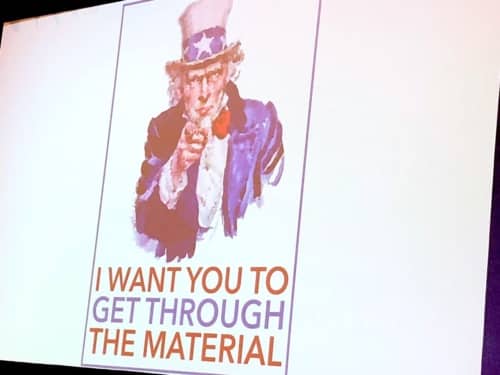Is emphasizing a standards-based education preventing students from more in-depth learning?
Do We All Need to Read “Hatchet”?
I was attending a middle school book fair and was perusing the shelves for something to purchase. There were the usual Harry Potter series, multiple items from Rick Riordan, and lots of books that alarmingly have more pictures than print in them. There sitting on the shelf, was this book without the usual supernatural vampires who know magic and live in a dystopian future. It was simply what looked like the image of an ax. I was quickly corrected as I read the title to be “Hatchet” by Gary Paulsen. This was a book that was very familiar to me, having seen it on the shelves in many classrooms over the 22 years of my teaching career or in the hands of many a middle school boy. I had even been at a conference the week before where one of the presenters was using “Hatchet” as an example of how to teach depth and complexity. I thought to myself,
Why have I never read this book before?
This was a bit perplexing. The book came out in 1987 when I would have just been entering high school. Even then I was an avid reader, often drowning out my chemistry or Geometry teachers as I read the latest Stephen King book at my desk. Not only that, it was the ultimate boy’s book. While the more popular books of that era were geared towards girls such as VC Andrews and Judy Blume, here was a book that every red-blooded boy should want to read, and yet I hadn’t. What had I been missing out on in life because I had not yet read this book? What advantages did those who had read it hold over me? What would I say if anyone ever asked me if I had read the book at a conference or dinner party?
These pangs of guilt caused me to snatch it from the shelf and quickly buy it before anyone had figured out I was doing so because I had not read it before. In my continued shame, I would only read the book in private, not wanting anyone to find out the horrendous truth. The further and further I read, the less concerned I became. About a quarter of the way through the book I realized, I really didn’t need to have read “Hatchet.” Sure, it is a pretty well-written book, and I was enjoying it, but if I had never seen it that day at the book fair, would my life had been the less for it?
I decided that no. I had survived my first 46 years of my life without having read the book and seemed to be doing just fine. I am positive I could have gone another 46 without reading it and have been great too. Well, as long as I don’t go down in a plane and crash in the woods in the wintertime.
This got me thinking. How important is it for students to be learning all of the content they are learning? I think about my life as an educator and how often content that I learned in school has been accessed. The answer is not very much. And in many cases, I had forgotten what I learned and had to reteach myself in order to understand it.
I have been in education long enough to remember when the standards movement began. In fact, I used to travel to a rural school district to try and help teachers figure out how to implement the standards into their curriculum and classrooms. I understand the principle behind it. Before, teachers could pretty much teach whatever they wanted, many times using a textbook as the base for the class. The idea of the standards movement was that there would be consistency and students would leave high school having all received the same general education. Or a student could move from one district to another, or even go to another state, and be able to join the class without any major concerns because all 5th grade classes in the United States were pretty much covering the same content standards.
But the longer I am in education, and the more I read such thought-provoking books as “What Schools Could Be” by Ted Dintersmith, “The Global Achievement Gap” by Tony Wagner, and “The Innovator’s Mindset” by George Couros, the more I think that standards-based education may be giving students a standard education, but don’t our children deserve better?
 This mile wide, inch deep curriculum is especially concerning with students who have the abilities to go into much greater depth on a topic. If teachers try to take something students are truly interested in and spend more time with it, the class will just get behind. And getting behind is the death knell of a class, isn’t it? Especially when they are going to be tested on it.
This mile wide, inch deep curriculum is especially concerning with students who have the abilities to go into much greater depth on a topic. If teachers try to take something students are truly interested in and spend more time with it, the class will just get behind. And getting behind is the death knell of a class, isn’t it? Especially when they are going to be tested on it.
And yet how much of this content that we are learning will we actually use in our real lives? Ted Dintersmith in his book says, “The tragedy of high school math. Less than 20% of adults ever use algebra. No adult in America still does integrals and derivatives by hand“. So why do we still require it for every student in high school? Why teach them something 80% of them will never use again? I am by no means saying math is not important. What I am saying is that there is math that is useful to your everyday life, and math that is not.
I am not suggesting we go back to the way things were where it was like the lawless wild west, teachers were just teaching anything they wanted to, some of which was useful, but just like the content standards, some that was not. What I am suggesting is that there is a middle ground. We should narrow the number of content standards we require, fashioning ones that have to do with real-world skills or as Tony Wagner called them, survival skills.

